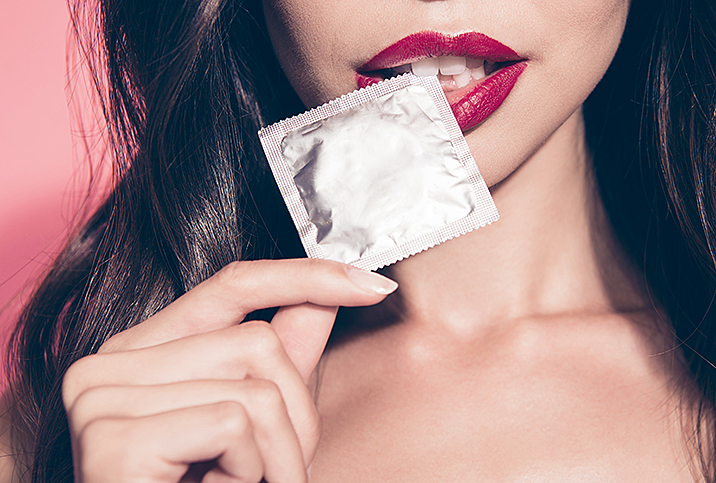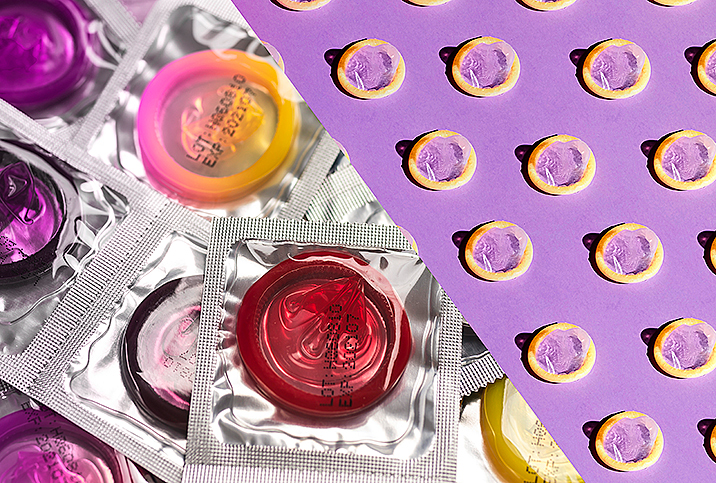Are Condoms Safe to Put in Your Mouth?

It’s the age-old question: Can I eat that? While it’s in your best interest to avoid actually ingesting a condom for obvious reasons, it’s likely one will eventually find its way in or around your mouth if you’re practicing safe sex.
Lest we forget, sexually transmitted infections (STIs) and diseases (STDs) can still spread via oral sex. The risk of transmitting chlamydia, HIV or herpes, among others, is still present even in the absence of penetration. This means condoms and dental dams are your only real line of defense whether you’re having sex with new, long-term or multiple partners.
'Condoms aren't super-savory—if you're hoping to avoid a sensory experience equivalent to fellating a new pair of galoshes, try flavored condoms.'
So, yes, of course, condoms during oral sex are a smart move for your sexual health, but are they safe in terms of your greater bodily health? After all, condoms are typically made of latex, polyurethane or other synthetic materials, which don’t exactly scream "suck this." And they aren't regulated by the U.S. Food and Drug Administration, which means labeling can be elusive or altogether nonexistent.
Rest assured, sucking on a condom won't lead to your demise. But some options prove safer than others. Daniel Sher, a clinical psychologist and sex therapy expert for Between Us Clinic, the online men's sexual dysfunction clinic, gave some insight on what to look out for.
What are condoms made of?
Just as with anything you put in your mouth, consider the ingredients. Outside of latex, the type of rubber found in the most popular and reliable condoms on the market, there are some additives that you need to know about.
Polyurethane
This clear plastic is super-thin and can actually transmit heat and heighten sensitivity during sex. Good. But they're less elastic, so there's a greater risk of breakage. Not so good. However, if you have a latex allergy, polyurethane condoms are a safe alternative.
Spermicide
Some condoms are coated in spermicidal lubricant, most commonly nonoxynol-9, which tastes particularly awful and can numb the inside of your mouth. Avoid, if possible.
Benzocaine
This topical anesthetic, found in some condoms to delay climax for the wearer, is a common ingredient in drugstore remedies for sore throats and canker sores. Sher points out that because it's a numbing agent, it can actually reduce sexual pleasure.
Lambskin
Lambskin condoms aren't as popular as they were in 15th-century China or throughout the Roman Empire, but they do still exist. They're a non-latex option made from lambs' intestinal membranes, not actual lamb's skin. Big downside: While they can prevent pregnancy, they don’t protect against STIs or HIV.
Casein
Casein is a dairy protein often added to soften the latex, making condoms comfortable and stretchy. It's found in most condoms on the market.
Go vegan
If you'd prefer to avoid animal products, opt for vegan condoms. They're environmentally ethical and just as safe, using ingredients like sustainably harvested, natural latex and thistle extract, while avoiding parabens, dyes and nitrosamines, which have been linked to cancer.
"These condoms have been put through rigorous—if you'll excuse my word selection—trials, passed government standards and been deemed as effective as regular condoms," Sher said.
Give it some flavor
Admittedly, condoms aren't super-savory. So, if you're hoping to avoid a sensory experience equivalent to fellating a new pair of galoshes, try flavored condoms. Depending on your palate, experiment with flavors ranging from the standard vanilla or tropical fruit to the slightly more inventive flavors—garlic, anyone?
"They can introduce a sense of fun and novelty," Sher said. "And, of course, they encourage people to explore with taste and oral stimulation, which can open up a whole other world of non-penetrative sexual pleasure."
Have fun with it, because let's be real, the giving or receiving end of oral can lose some appeal when a condom is involved. But, as the past year has made abundantly clear, little sacrifices are sometimes necessary for the greater good. If you want to don a condom during oral, it's safe in more ways than one.


















